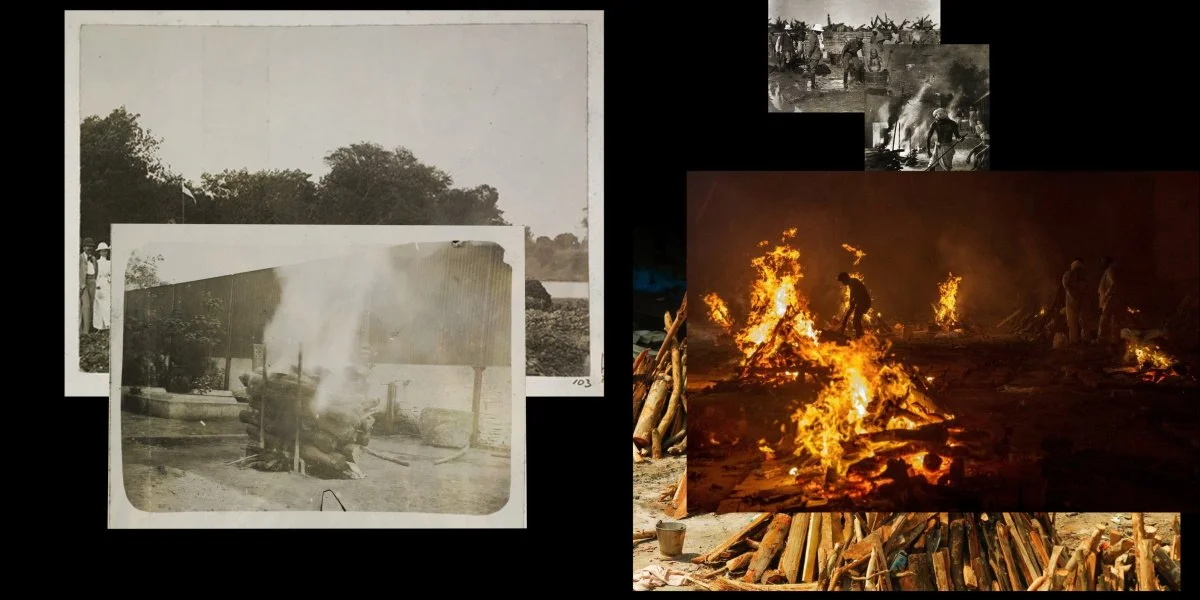Aimé Césaire, the late writer, politician, and co-founder of the Négritude movement, proposed a new hybrid science in 1946 — a science of the Word. He argued that the study of the Word (mythoi, a poetics of knowledge) will condition the study of nature (bios). Philosopher Sylvia Wynter, inspired by Césaire’s idea, stated that humans must now collectively undertake a rewriting of knowledge as we have known and understood it. Can science deal with and make sense of the human predicament, as Wynter calls it? How can scholars, artists, scientists, and the general public reconcile the tension between scientific and technological advancement, the earth-centered mandate of indigenous wisdom, and righting historical legacies colonial violence?
Curated by Jheanelle Brown.
In-person Q&A after the screening with filmmaker Mariam Ghani.
SCREENING
内共生 (Inside the Shared Life)
Erin Espelie 2017, 9:13m, HD video & 16mm, color, sound
This film combines sounds of marine life with moving images of the circulatory system, life at different scales, and Lynn Margulis's words on accepted versus iconoclastic science. She talks also about time, how the new is privileged over the true. This film has a captivating slowness. Among other things, it seems to be about epistemology, how we know or don't know. Dorion Sagan for Vdrome
The Violence of a Civilization without Secrets
Adam Khalil, Zack Khalil, Jackson Polys, USA, 2017, digital, color, sound, 9:45
Filmmakers Adam and Zack Khalil, in collaboration with artist Jackson Polys, investigate the recent court case that decided the fate of the remains of a prehistoric Paleoamerican man found in Kennewick, Washington State in 1996. The video is an urgent reflection on indigenous sovereignty, the undead violence of museum archives, and post-mortem justice.
The Fire This Time
Mariam Ghani, USA, 2022, digital, color, sound, 26:08
A kaleidoscopic trip through the intertwined histories of pandemics, riots, and colonial violence. An archive constantly haunted by its possible collapse.
Featuring the voices of science journalist Sonia Shah, poet and literary scholar Anjuli Raza Kolb, medical anthropologist Christos Lynteris, epidemiologist Keiji Fukuda, economist William A. Darity Jr., and historians Nayan Shah, Kellie Carter Jackson, and Nancy Tomes.
JIÍBIE
Laura Huertas Millán, 2019, digital, color, sound, 24:46
Conversations are rituals. The Murui Muina, Amazonian and Colombian first nation, have particularly elevated this art and its political implications through the ritual de la palabra dulce, a collective conversation allowed by the use of the coca plant powder, called mambe or jiibie. During the ritual, the most pressing political questions are discussed collectively: subjects such as neo-colonialism, ecology, activism but also questions of family and intimate life are considered. In this film, the fabrication of the coca powder in preparation for the ritual unveils an ancestral myth of kinship. The coca plant is neither a product nor an object, but a person, a sacred interlocutor, a kin, the beating heart of a collective body.
Dust to Data
Larry Achiampong and David Blandy, UK, 2021, digital, color, sound, 15:25
Dust to Data tracks through the colonial history of archaeology, to current parallels in the data mining of DNA and social media image banks. Working with the Department of Archaeology at the University of Liverpool, Larry Achiampong and David Blandy interrogate the construction of a ‘civilisation’ and its racist ‘origin’ stories that define people into categories: some as human and neutral, others as non-human and/or abnormal.
In the film, Achiampong and Blandy employ motifs, such as the recurring gleaming pyramid as an image of order and hard simplicity, and 3D models of Australopithecine skulls (extinct close relatives of humans who lived around two million years ago). The film also features a fragment of a letter from William Du Bois, author of the seminal book about race and society The Souls of Black Folk, rebuking one of the pioneers of modern archaeology, William Petrie.
Dust to Data explores how science has been used to justify prejudice. This can be found in the origins of archeology, exposing the archaic mathematical tactics employed by Petrie to justify his own assertions about white supremacy. Although debunked by his contemporaries, Petrie embraced eugenics - the practice of altering or ‘improving’ the human species through selective breeding - as a tool for social control. This view was integral to the birth of archaeology, and its pseudo-scientific legacy still permeates fractious assumptions within the field and in wider culture today.
Tickets: $10 General | $8 Student/Seniors | FREE for LA Filmforum Members
via link.dice.fm
Jheanelle Brown, Los Angeles Filmforum board member is Project Director and Curator, leading project management, offering scholarly and curatorial guidance to project scholars, developing several film programs, developing the overall curatorial framework of the film series, and serving as co-editor of the resulting publication. Jheanelle is a film curator/programmer, lecturer, and arts administrator based in Los Angeles whose curatorial practice creates frameworks to explore the boundlessness of Black life in experimental and non-fiction film and video. She is currently Special Faculty at California Institute of the Arts. She has co-curated Time Is Running Out of Time: Experimental Film and Video from the L.A. Rebellion and Today and the traveling film showcase Black Radical Imagination: Fugitive Trajectories from 2018 to 2019.
Mariam Ghani is an artist and filmmaker, whose work operates at the intersections oflanguage, loss, migration, memory, and history. Her films, public projects, and installations havebeen presented worldwide, notably in Times Square and LaGuardia Airport; the Guggenheim,MoMA, Smithsonian, and Metropolitan Museums; Documenta 13 and the Liverpool, Lahore,Yinchuan, and Sharjah Biennials; and the Rotterdam, CPH:DOX, SFFILM, DOC NYC, and AnnArbor film festivals, among others. Ghani’s first feature, the critically acclaimed documentaryWHAT WE LEFT UNFINISHED, premiered at the 2019 Berlinale, was released theatrically byDekanalog, and had its streaming premiere on the Criterion Channel. Her second feature film,DIS-EASE, premiered at the Tate Modern in August 2024. Ghani teaches film/video at Bennington College.






